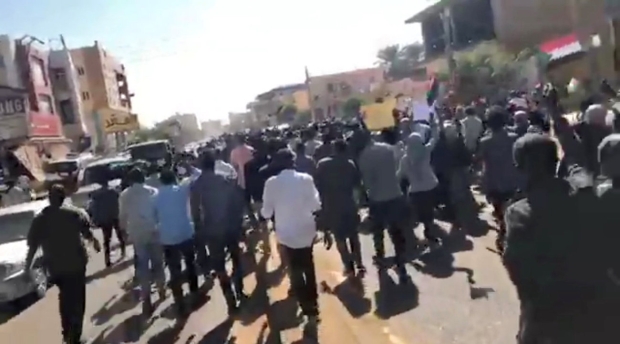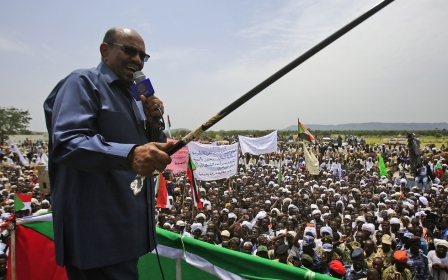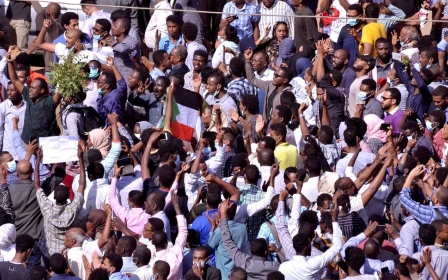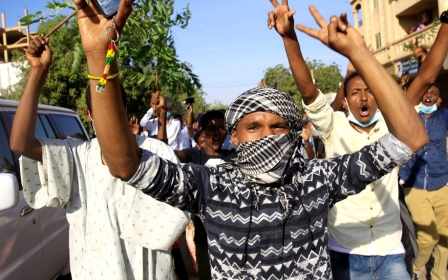Sudan's Bashir remains defiant as three killed at anti-government protest
KHARTOUM, Sudan - Three protesters have died as the Sudanese capital region was divided on Wednesday, with people taking to the streets of Khartoum to show their support for President Omar al-Bashir, while protesters in Omdurman, the capital's twin city, called for his immediate resignation.
On Thursday, police confirmed that three protesters had died in the Omdurman protest but did not specify how they had died.
"An illegal gathering was held in Omdurman and police dispersed it with tear gas," police spokesman Hashim Abdelrahim said in a statement.
"Police later received reports that three protesters had died and several injured. We are now investigating."
Earlier, thousands of the president's supporters, including members of the ruling National Congress Party (NCP), had chanted slogans in the centre of Khartoum during the pro-government rally, which was broadcast on Sudanese state television.
Many of the protesters raised banners in support of the Sudanese army, the NCP and the country's security services, while calling for Bashir to remain in power to guarantee the country's security and stability.
Sudan has been rocked by anti-government protests that erupted last month amid simmering anger over an increase in bread prices and have since morphed into an unprecedented movement calling for Bashir's ousting.
“We shouldn’t allow this country to be hijacked by mercenaries,” Ahmed Altahir, one of the president's supporters, told Middle East Eye on Wednesday, echoing some of the president's own comments accusing outside forces of stirring violence.
“Bashir is the only one who can save this country," added another government supporter, Zahra Alhassan.
Live ammunition fired at anti-government protesters
The mood was different across the Nile River in Omdurman, where thousands of anti-government protesters took to the streets to reiterate their demand for the country's longtime leader to step down.
Police fired tear gas, rubber-coated steel bullets and live ammunition at the protesters, who burnt tyres and marched through several main streets, which were shut down as a result of the demonstration.
The protesters chanted, “Freedom, peace and justice" and "the revolution is our choice” through the streets.
Protesters and eyewitnesses told MEE that Sudanese security forces fired tear gas inside homes in some of the town's more residential areas, including Mawrada and Arbaeen. They also said police searched homes for protesters who had been sheltered by local families.
“They raided my home and some homes around it," one protester told MEE on condition of anonymity for fear of reprisals.
The protester said security forces "lashed" him and his brothers, accusing them of hiding protesters who escaped after tyres were set on fire in nearby streets.
At Omdurman hospital alone we received four cases of injuries caused by live bullets and we believe the number [of injured] is higher
- Sudanese doctors' central committee
The central committee of Sudanese doctors, meanwhile, reported that four people were treated for bullet wounds at Omdurman public hospital, while tear gas was fired inside the facility.
“At Omdurman hospital alone we received four cases of injuries caused by live bullets and we believe the number [of injured] is higher... We are still checking with the other hospitals," the committee said in a statement.
Khaled Albaih, a Sudanese man living outside of the country, said his family in Sudan told him their home was broken into by security forces.
“They were in the house with guns. They broke the door,” Albaih told MEE. “[They] went in the house, where the guys were hiding, hit whoever they found and took some of them.”
Albaih said his mother saw riot police beating a young man in their car.
The police then hit older women who attempted to free the man from police custody, he said his mother told him.
"They’re not taking any protesters to jail anymore because the jails are full," Albaih said.
Bashir remains defiant
Despite the ongoing protests urging him to step down, Bashir has remained largely defiant, calling on his supporters to stand with him to ensure the country's stability.
Speaking to his supporters at the rally on Wednesday, he accused Western countries and other forces of exploiting the economic situation in Sudan to undermine his government.
“Sudan has been targeted since its independence and the current economic situation is part of this targeting, but we still have some friends, including China, Russia, the United Arab Emirates, Kuwait and Qatar," he said.
He called on all political parties in Sudan, including the opposition, to enter into a dialogue, then accused them of plotting with foreign powers to create instability.
"There are some political parties that are plotting with some foreign countries to cause chaos and violence, but we won't allow the chaos to take hold," he said.
"The only way to come to power is through elections, which will be free and fair."
Bashir also seemed keen to address members of the army and police force, after reports of divisions between the two bodies.
"We appreciate the struggles and efforts of the national army and we also appreciate the good behaviour and discipline of the security agencies and the police in dealing with the protesters," he said.
Sudanese officials say 19 people, including two security officials, have been killed since the protests began, while Amnesty International and Human Rights Watch put the number at double that.
At least 800 people have also been arrested, a Sudanese official said this week, while human rights groups have accused the government of launching a crackdown on human rights activists, journalists and critics in order to stem the protests.
Middle East Eye propose une couverture et une analyse indépendantes et incomparables du Moyen-Orient, de l’Afrique du Nord et d’autres régions du monde. Pour en savoir plus sur la reprise de ce contenu et les frais qui s’appliquent, veuillez remplir ce formulaire [en anglais]. Pour en savoir plus sur MEE, cliquez ici [en anglais].





